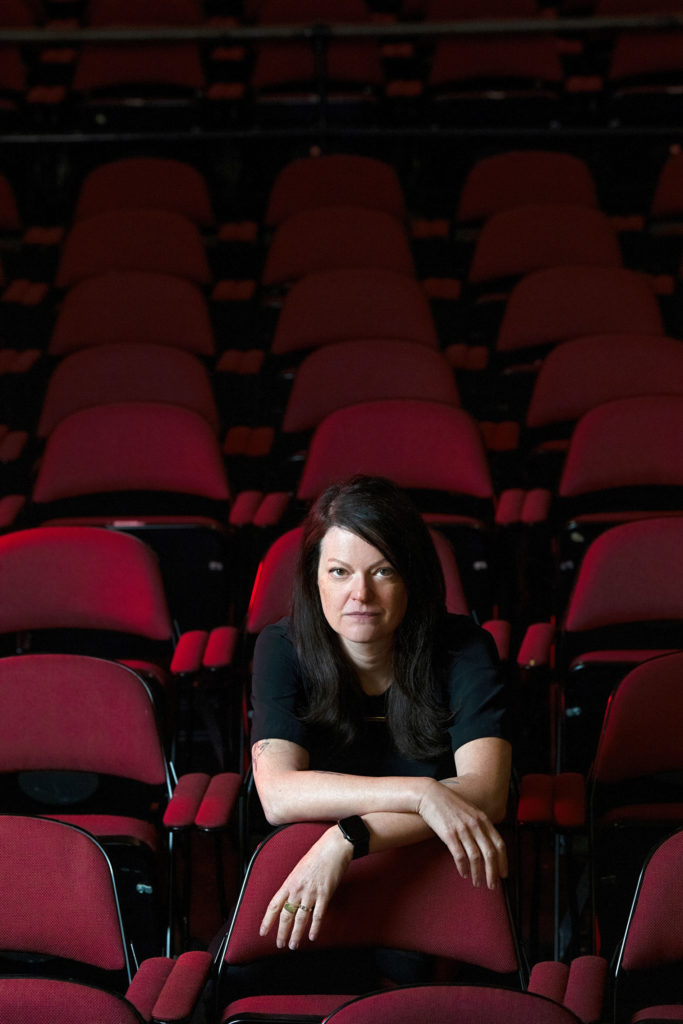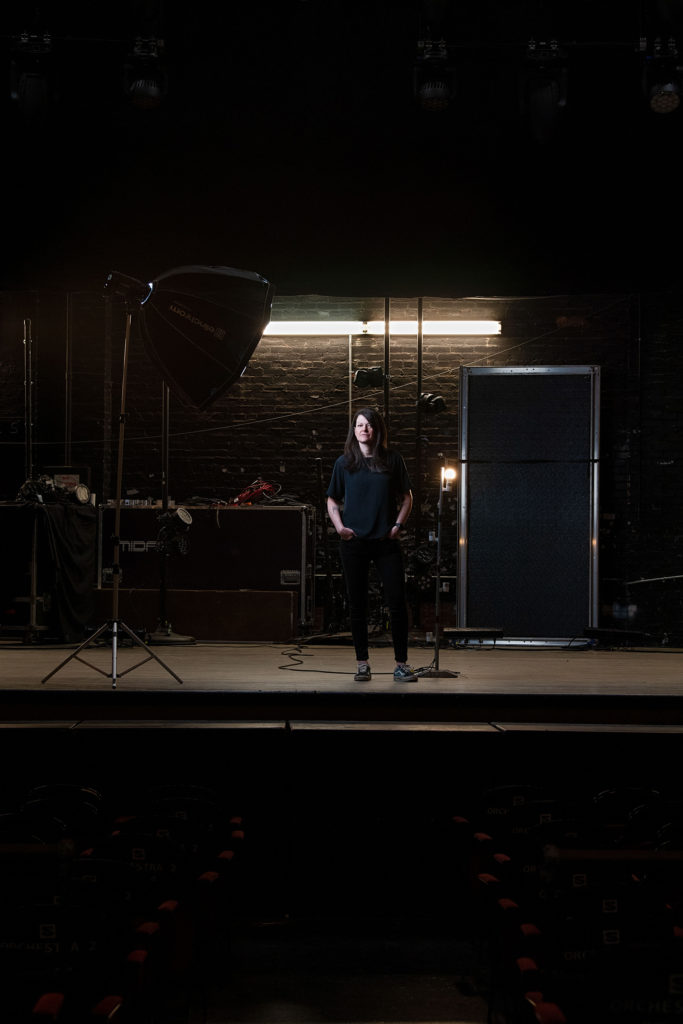The Woman Behind the Curtain at the State Theatre
Maine's biggest concert promoter Lauren Wayne, on what it's been like to run the State Theater during a pandemic, and why she moved to Portland 20 years ago.

The Woman Behind the Curtain at the State Theatre
Lauren Wayne talks about why she moved to Portland, what it’s like to run a venue during the pandemic, and the show she’s most excited for when concerts return.
by Paul Koenig
Photography by Nicole Wolf
Issue: June 2021
If you’ve been to a concert in Portland in the past two decades, there’s a good chance you have Lauren Wayne to thank. Wayne began her career working at the Portland office of a Boston-based concert promoter and was brought on as general manager of the State Theatre for the historic performance hall’s reopening in 2010. Wayne is also responsible for booking the outdoor concerts at Thompson’s Point and was general manager of Port City Music Hall before the COVID-19 pandemic forced the State Theatre’s parent company to permanently close it. The State Theatre hasn’t reopened since shutting its doors in March 2020, but Wayne says operators of performance venues around the country expect they’ll be able to reopen in the fall—if the vaccination rollout goes well. [Editor’s note: Since this interview in April, the State Theatre began announcing shows scheduled for this summer.]
When people find out what you do, what’s the first question they ask?
They usually just ask me if I hang out with the artists, which I do not do. Even though our offices are literally right next to the green rooms backstage, we tend to try to stay out of their way, unless they want to hang out. They’re like, “Oh, you’re so lucky.” And I’m like, “Have you ever lost a person’s salary in one show?” Sometimes I don’t feel lucky. I just feel really bad at my job. But overall, it’s great.
What do you think people don’t understand about what it’s like to run a venue right now?
I think people are sad that venues are closed, and it’s definitely sad not to have live music, but I don’t think people get to the depths of “This is somebody’s business.” In normal times, you don’t want people to think about what it takes. You just want someone to buy a ticket and go to a show and have fun. I don’t think we want people to think about it that much, until we closed in March. We don’t have any opportunity to open at half capacity because it just doesn’t work for our business model, so we are still almost 100 percent down in terms of revenue. It’s not like we can, to use my least favorite word, pivot to make any revenue. We’re not in the curbside concert business. Our whole business model is built around national tours and having thousands of people in one room celebrating together.
What show are you most looking forward to seeing when concerts return?
The first one. Honestly, that’s the answer. I don’t care who it is. It’s going to be the best feeling I’ve had in a while, at least in the last year and a half.
Do you have any idea how many shows you’ve booked in Portland over the years?
Oh, god no. A lot. Thousands. Too many to count. I guess that’s the answer. I mean, you name it, it was probably mine.
It does seem like you’ve booked the majority of Portland shows in the past couple decades.
That’s actually funny to think of. I’ve never thought about it that way. But I guess if you’ve gone to a show in the past 20 years, it’s most likely been my show.
How does that feel?
I’ve never put that into words or said that out loud. It feels pretty damn good, and I don’t have an ego. Sometimes I hesitate to slow down to think about the past and what I’ve done and what we, in terms of our company, have created here. It’s phenomenal. We’ve obviously changed the music game in Portland, if not all of Maine. I’m just psyched that I picked the right town to live in. I could feel that the first year I was here. I made a conscious decision to stay here, and it’s the longest I’ve lived anywhere in my life, by 14 years. It says a lot about the city. It’s just a cool city. And to have a hand in helping grow the city and get it to where it is today, it’s humbling and it’s very inspiring.
What originally drew you to Portland?
My friends and I lived in Sedona, Arizona. We wanted a change, and I’d never even been to New England. So, we came and landed in my friend’s parents’ second home in New Hampshire. We stayed there for three or four months until we kind of figured out what we wanted to do. We came over to Portland one night, and we were like, “This is where we’re going to move.” We signed a lease a week later and moved over here.
What was it about Portland that first night that hooked you?
J’s. J’s Oyster was the very first place we went. I just remember sitting at the bar, and we were like, “Yep.” It was the small-town vibe. It felt like you could, if you wanted to, get to know almost anybody in the town. Nine times out of ten you’d know someone at the bar. And our good friends owned and operated the Skinny [a rock club that closed in 2003], which was a block down the street from where we lived. We spent a lot of time there. I could see a city that you knew—you could feel really it back then—was on the verge of an explosion.
So, J’s Oyster is responsible for thousands of acts coming to Portland?
It’s all J’s. J’s and the Skinny. It’s true.





